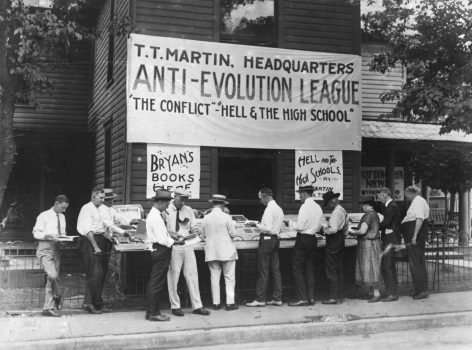
By A.J. Schumann
In the sweltering summer of 1925, a sleepy southern town became the stage for one of the most iconic legal showdowns in American history. Dayton, Tenn., population 1,800, hosted what came to be known as the Scopes Monkey Trial – a court case that was ostensibly about whether evolution could be taught in public schools, but quickly turned into a nationwide debate about secular education and the role of religion in public life.
A century later, the issues at the heart of Tennessee v. Scopes still animate our fiercest political and legal battles. Public education is once again under siege from a sustained effort by Christian Nationalists to blur the line between church and state. To understand what’s happening in school boards and statehouses across the country, it’s worth taking a look back on the courtroom clash in Dayton that brought these issues into the national spotlight.
John T. Scopes, a 24-year-old science teacher, was accused of violating Tennessee’s Butler Act, which banned the teaching of any theory that denied the divine creation of man as portrayed in the Bible. In truth, the trial was a test case deliberately staged by the ACLU to challenge the constitutionality of the law. (Dayton town leaders also helped to engineer and sensationalize the trial, hoping to bring attention that would reawaken their stagnant town.)
What made the Scopes Monkey Trial unusual was the sheer star power involved in the case. On the defense was Clarence Darrow, one of the nation’s most famous trial attorneys and an outspoken agnostic, who saw the case as a chance to champion the legitimacy of scientific education. Representing the prosecution was William Jennings Bryan, a three-time presidential candidate and devout Presbyterian who viewed the teaching of evolution as a threat to religious faith and the moral order of society. Broadcast live on the radio – the first court case ever to be so aired – the trial became a cultural flashpoint.
But for all the spectacle, the outcome was sobering. Scopes was found guilty and fined $100 (about $1,800 today). Although the verdict was later overturned on a technicality, the law itself stood for decades. Upon sentencing, Scopes said, “Your honor, I feel that I have been convicted of violating an unjust statute. I will continue in the future, as I have in the past, to oppose this law in any way I can. Any other action would be in violation of my ideal of academic freedom – that is, to teach the truth as guaranteed in our constitution, of personal and religious freedom.”
His words cut to the heart of the matter: This wasn’t simply about evolution or creationism, it was about whether the government could use religion to dictate what is taught in public schools. Put another way, it was about whether public education would serve all students or only those who conformed to a particular religious worldview.
If the culture war surrounding the Scopes Monkey Trial sounds familiar, it’s because we’re living through a modern sequel. From Florida’s ban on “controversial” topics like race and gender to efforts in Louisiana, Arkansas, Texas and other states to require that the Ten Commandments be posted in classrooms, we’re witnessing a concerted attempt to remake public education in the image of a narrow religious ideology.
Today’s Christian Nationalist rhetoric echoes the anti-modernist anxieties of the 1920s – fear that secularism is destroying “traditional values” and that public institutions should reflect a “Christian America.” But this vision of the past is less a historical reality than a selective memory that imagines Christianity not just as part of America’s story, but as its foundation.
Fortunately, the Constitution doesn’t make exceptions for nostalgia. The First Amendment protects all Americans – the devout, the secular, and everyone in between – from having any single belief system imposed on them by the state. When public schools are compelled to censor scientific or historical truths that conflict with a particular religious worldview, it doesn’t just undermine academic integrity, it threatens the constitutional rights of every student in the classroom.
This is why the Scopes Monkey Trial still matters today. At its core, it wasn’t a contest of science and religion, but a test of whether the truth could survive in a climate of fear, and whether the classroom could remain a space for inquiry rather than indoctrination. The trial reminds us that the separation of church and state is not something we can take for granted. It is a principle that must be actively defended, especially in moments of cultural anxiety and political division, when calls to return to some mythic past grow loudest.
A.J. Schumann is a Youth Organizing Fellow with Americans United for Separation of Church and State.
Photo: Anti-evolution books on sale in Dayton, Tenn., during the Scopes Monkey Trial. (Photo credit: Topical Press Agency/Getty Images)